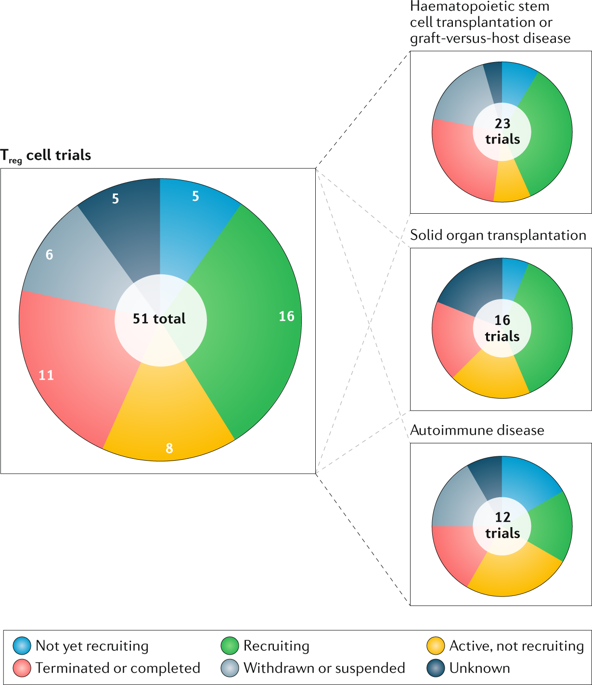当前位置:
X-MOL 学术
›
Nat. Rev. Drug. Disc.
›
论文详情
Our official English website, www.x-mol.net, welcomes your
feedback! (Note: you will need to create a separate account there.)
Next-generation regulatory T cell therapy.
Nature Reviews Drug Discovery ( IF 122.7 ) Pub Date : 2019-09-20 , DOI: 10.1038/s41573-019-0041-4 Leonardo M R Ferreira 1, 2, 3 , Yannick D Muller 1 , Jeffrey A Bluestone 2, 3 , Qizhi Tang 1, 2
Nature Reviews Drug Discovery ( IF 122.7 ) Pub Date : 2019-09-20 , DOI: 10.1038/s41573-019-0041-4 Leonardo M R Ferreira 1, 2, 3 , Yannick D Muller 1 , Jeffrey A Bluestone 2, 3 , Qizhi Tang 1, 2
Affiliation

|
Regulatory T cells (Treg cells) are a small subset of immune cells that are dedicated to curbing excessive immune activation and maintaining immune homeostasis. Accordingly, deficiencies in Treg cell development or function result in uncontrolled immune responses and tissue destruction and can lead to inflammatory disorders such as graft-versus-host disease, transplant rejection and autoimmune diseases. As Treg cells deploy more than a dozen molecular mechanisms to suppress immune responses, they have potential as multifaceted adaptable smart therapeutics for treating inflammatory disorders. Indeed, early-phase clinical trials of Treg cell therapy have shown feasibility, tolerability and potential efficacy in these disease settings. In the meantime, progress in the development of chimeric antigen receptors and in genome editing (including the application of CRISPR-Cas9) over the past two decades has facilitated the genetic optimization of primary T cell therapy for cancer. These technologies are now being used to enhance the specificity and functionality of Treg cells. In this Review, we describe the key advances and prospects in designing and implementing Treg cell-based therapy in autoimmunity and transplantation.
中文翻译:

下一代调节性 T 细胞疗法。
调节性 T 细胞(Treg 细胞)是免疫细胞的一小部分,致力于抑制过度的免疫激活和维持免疫稳态。因此,Treg细胞发育或功能的缺陷会导致免疫反应失控和组织破坏,并可能导致炎症性疾病,例如移植物抗宿主病、移植排斥和自身免疫性疾病。由于 Treg 细胞部署了十多种分子机制来抑制免疫反应,因此它们有潜力成为治疗炎症性疾病的多方面适应性智能疗法。事实上,Treg 细胞疗法的早期临床试验已显示出在这些疾病中的可行性、耐受性和潜在疗效。与此同时,过去二十年嵌合抗原受体的开发和基因组编辑(包括CRISPR-Cas9的应用)方面的进展促进了癌症初级T细胞疗法的遗传优化。这些技术现在被用来增强 Treg 细胞的特异性和功能。在这篇综述中,我们描述了在自身免疫和移植领域设计和实施基于 Treg 细胞的疗法的关键进展和前景。
更新日期:2019-09-21
中文翻译:

下一代调节性 T 细胞疗法。
调节性 T 细胞(Treg 细胞)是免疫细胞的一小部分,致力于抑制过度的免疫激活和维持免疫稳态。因此,Treg细胞发育或功能的缺陷会导致免疫反应失控和组织破坏,并可能导致炎症性疾病,例如移植物抗宿主病、移植排斥和自身免疫性疾病。由于 Treg 细胞部署了十多种分子机制来抑制免疫反应,因此它们有潜力成为治疗炎症性疾病的多方面适应性智能疗法。事实上,Treg 细胞疗法的早期临床试验已显示出在这些疾病中的可行性、耐受性和潜在疗效。与此同时,过去二十年嵌合抗原受体的开发和基因组编辑(包括CRISPR-Cas9的应用)方面的进展促进了癌症初级T细胞疗法的遗传优化。这些技术现在被用来增强 Treg 细胞的特异性和功能。在这篇综述中,我们描述了在自身免疫和移植领域设计和实施基于 Treg 细胞的疗法的关键进展和前景。






























 京公网安备 11010802027423号
京公网安备 11010802027423号